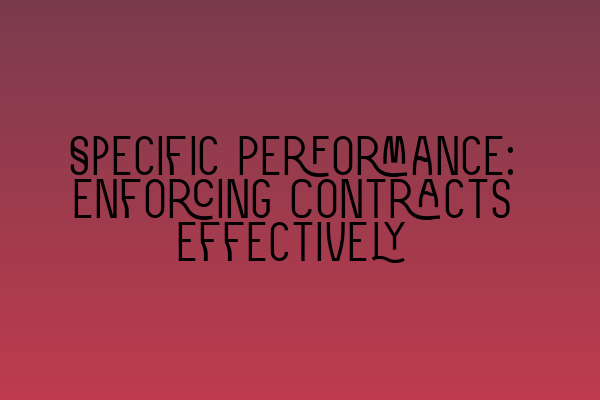Specific Performance: Enforcing Contracts Effectively
In the world of contract law, enforcing the terms of an agreement can be a challenging task. Parties may fail to fulfill their obligations, leading to disputes and the potential for financial loss. When it comes to resolving such conflicts, one legal remedy that can be particularly effective is specific performance.
Specific performance is a judicial order that requires a party to perform its contractual obligations exactly as outlined in the agreement. This remedy is typically sought when monetary damages are inadequate or unattainable. It is particularly applicable in cases involving unique goods, real estate, or personal services where finding a suitable substitute is difficult or impossible.
To fully understand the implications and benefits of specific performance, it is important to delve into its characteristics and application in contract law.
1. The nature of specific performance. Specific performance is considered an equitable remedy, meaning it is based on principles of fairness rather than strict legal rights. It is a discretionary remedy that is granted by a court when it determines that it is the most appropriate solution to a contractual dispute. The court will consider factors such as the feasibility of performance, the extent of harm caused to the non-breaching party, and the availability of other remedies before making a decision.
2. Scope of specific performance. While specific performance is a powerful remedy, it is not available for all types of contracts. The court will evaluate the unique circumstances of each case to determine whether specific performance is a suitable option. For example, contracts involving personal services or contracts involving a continuous obligation may not qualify for specific performance. It is vital to consult with a qualified contract law solicitor to assess the viability of seeking specific performance in a particular matter.
3. Benefits of specific performance. One of the main advantages of pursuing specific performance is that it ensures the non-breaching party receives the exact benefit they bargained for. This can be crucial in cases involving one-of-a-kind items or where the monetary value does not accurately reflect the true worth of the contractual agreement. Additionally, specific performance can often preserve the commercial relationship between the parties involved, as it requires them to fulfill their obligations rather than terminate the agreement.
4. Challenges in obtaining specific performance. Despite its benefits, obtaining a specific performance order can be challenging. The court will carefully consider several factors, such as the practicality of enforcing the obligation, the extent of harm caused to the non-breaching party, and the availability of other remedies. The burden of proof lies with the party seeking specific performance, and they must demonstrate that monetary damages would not adequately compensate for the harm suffered. It is crucial to present a compelling case with the assistance of an experienced contract law solicitor.
5. Alternatives to specific performance. In cases where specific performance is not deemed suitable, other remedies may be available to address the breach of contract. These may include monetary damages, reliance damages, or injunctions that prevent further breaches. It is important to explore the full range of legal options and consult with a contract law solicitor to determine the most appropriate course of action.
As contracts form the backbone of commercial transactions, ensuring their effective enforcement is essential. Specific performance offers a powerful remedy that can effectively resolve contract disputes and provide the non-breaching party with the exact benefit they bargained for. Whether it involves unique goods, real estate, or personal services, seeking specific performance can be a valuable strategy in obtaining the desired outcome.
If you are pursuing a career in contract law and are preparing for the SQE exams, make sure to check out our SQE 1 Practice Exam Questions and SQE 1 Practice Mocks FLK1 FLK2 articles. These resources will help you enhance your knowledge and test your understanding of contract law principles.
Additionally, for comprehensive SQE 2 and SQE 1 preparation courses, visit our SQE 2 Preparation Courses and SQE 1 Preparation Courses pages. We offer expert guidance and support to help you excel in your legal career.
Stay up to date with the latest SRA SQE Exam Dates to ensure you plan your studies effectively and have ample time to prepare for the exams.
Remember, the path to becoming a successful contract law solicitor requires a strong understanding of remedies such as specific performance. By mastering this area of law, you can effectively advocate for your clients and ensure the enforcement of contractual obligations.
